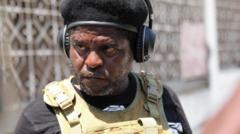A series of violent attacks involving car bombs and gunfire in southwestern Colombia have resulted in at least four deaths, including two police officers. The violence is reportedly connected to factions of the Revolutionary Armed Forces of Colombia (FARC) and has ignited fears reminiscent of the country's turbulent past.
Surge of Violence in Colombia: Bomb Attacks Leave Four Dead

Surge of Violence in Colombia: Bomb Attacks Leave Four Dead
Recent bomb and gun assaults in Colombia lead to multiple fatalities, including police officers, prompting concerns over escalating security issues.
In a shocking escalation of violence, Colombia has witnessed a wave of deadly bomb and gun attacks, claiming at least four lives, according to reports emerging from local media. Among the deceased are two police officers, as various municipalities, particularly the third-largest city of Cali, have been targeted.
Authorities have described a chaotic scene where car bombs, motorcycle bombs, and gunfire were unleashed on police stations, municipal buildings, and civilian establishments, contributing to an ongoing security crisis within the country. Although local media has suggested that certain attacks may be linked to factions of the Revolutionary Armed Forces of Colombia (FARC), the BBC has yet to independently verify these claims.
In terms of the overall impact, multiple injuries have been reported, but exact figures regarding the injured and deceased remain uncertain. The Colombian Ministry of Defence has confirmed that 19 separate attacks occurred in the southwestern parts of the nation, with the Cauca region suffering the brunt of the assaults, encompassing 12 attacks, followed by seven in the Valle del Cauca region.
The ministry has characterized this violent outburst as a "desperate reaction" from illegal armed groups facing a relentless crackdown from military and police forces, which have significantly undermined their criminal operations and economic foundations.
Notably, this surge of violence follows the recent attempted assassination of presidential candidate Miguel Uribe Turbay in the capital city, Bogota, as he engaged with supporters. Local leaders, including the mayor of Cali, have ominously compared the current situation to the violent drug trade and cartel conflicts that plagued the region in the late 1980s. The ongoing turmoil highlights the precarious state of safety and stability in Colombia as it grapples with its past and uncertain future.


















